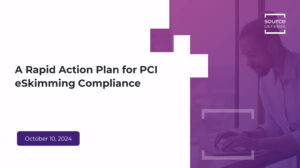
[Recording] A Rapid Action Plan for PCI eSkimming Compliance
Discuss New Trends in eSkimming: Recent reports show a 103% surge in attacks; card associations are saying 80+% of fraud is eSkimming related; Source Defense and Verizon have partnered to shed light on the growing threat surface – learn why the time to act is NOW.




